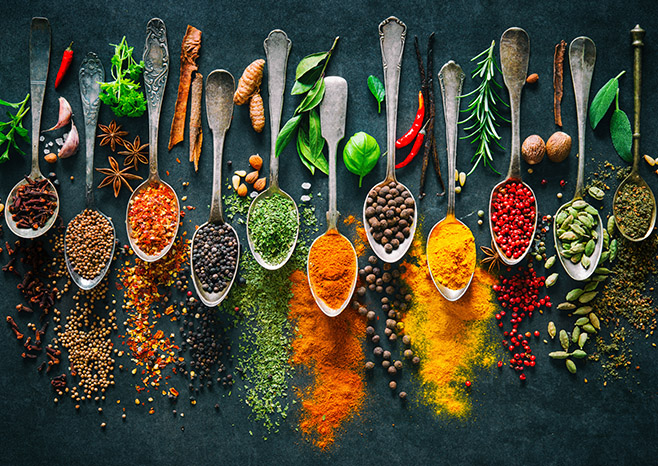
Herbs and Spices for Your Health
People who love to cook know that using herbs and spices in your dishes adds flavor and depth, taking food from bland to sublime. These same herbs and spices can also have remarkable effects on your health, but this idea brings up many questions. What kinds of herb and spices are best? How much should be used? Does it matter if it’s taken in supplement form or should it be sprinkled on food? Here are some answers:
The Big Six
While many herbs and spices are good for your health, these six offer the greatest benefits for common health concerns.
Turmeric. A bit of a wonder spice, turmeric is a bitter root that is available fresh, ground, or in supplement form. It fights inflammation almost on par with certain pharmaceuticals, but it’s difficult to get the required daily amount by adding it to food, so supplements are suggested.
Cinnamon. This savory spice comes from the inner bark of the Cinnamomum species of tree. It may lower blood sugar, so it may be helpful in controlling diabetes. It may be difficult to consume enough daily to receive benefits, so supplements may be better, although be careful not to take too much, because high doses can be toxic.
Ginger. Long known for its stomach-calming effects, ginger is available in whole root form, ground, and in extracts. One gram has been shown to be effective, so using it in cooking or beverages is a delicious and easy way to get the recommended daily dose.
Cayenne. This chili has been shown to reduce pain and inflammation. Widely available in powder form, supplements and creams, how you take it depends on why you’re taking it. It’s a popular ingredient in weight-loss supplements also, as it may help control appetite.
Garlic. The compound allicin, which is what gives garlic its distinctive flavor, is an ancient medicinal plant. Studies have shown it to be potentially helpful in boosting the immune system, as well as reducing cholesterol and high blood pressure. If you like the taste, eat at least one clove daily. Otherwise, supplements are just as effective and don’t have an odor.
Peppermint. Especially helpful in fighting nausea, the oil from this leafy herb can also help ease the pain and bloating associated with Irritable Bowel Syndrome. If you’re using it medicinally, teas and oil supplements are your best route.
If you do choose to take herbal supplements, make sure you do your research and only buy from reputable manufacturers. If you’re taking any medication, speak to your doctor first to make sure there are no potential interactions.




